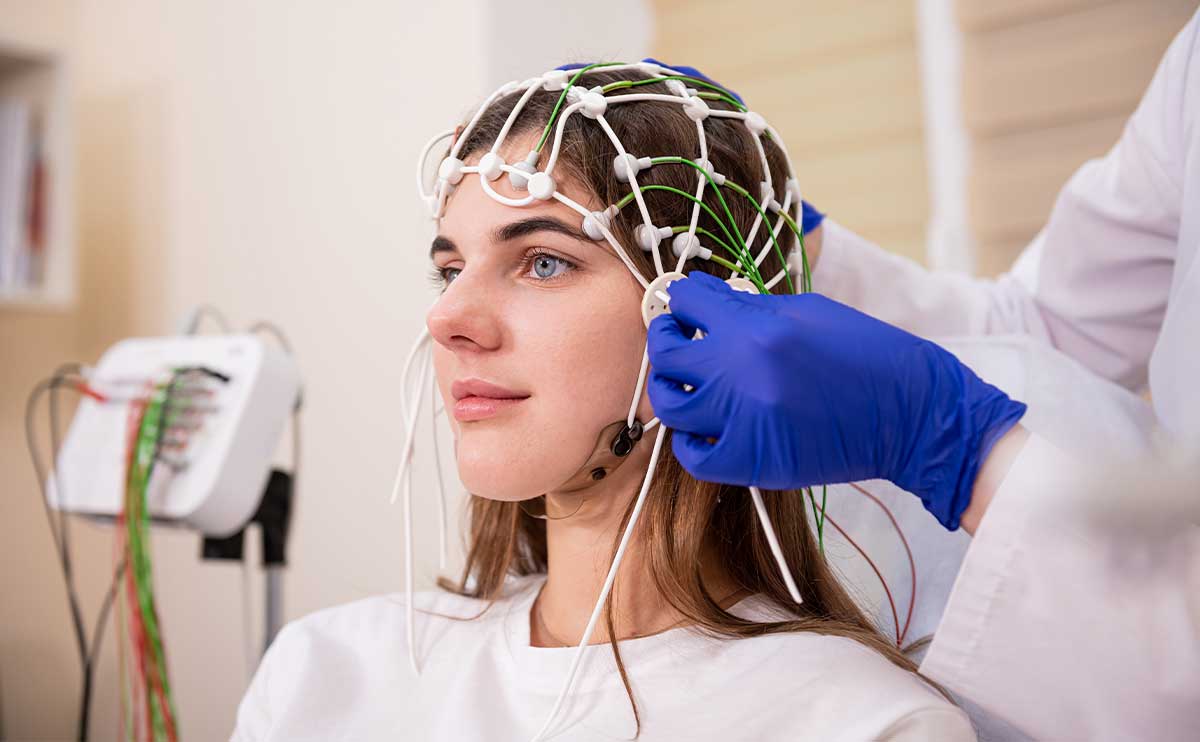EEG; Electroencephalography is an important diagnostic method that evaluates brain functions and electrical activities. EEG, which is widely used especially in the diagnosis of neurological diseases, contributes to the diagnosis of diseases by measuring brain waves.
Doctors who are experts in their field, such as Specialist Neurologist Gökçen Hatipoğlu, who serves in the neurology office located on Bağdat Street, Istanbul, evaluate the condition of their patients with EEG and plan appropriate treatment methods.
What is EEG?
EEG is a test that measures the electrical activities of the brain. Brain cells produce electrical signals when communicating with each other, and the EEG device detects these signals. In this way, problems such as abnormal activities in the brain, epileptic seizures or other neurological disorders can be detected. During EEG recording, electrodes placed on the scalp record brain waves and a diagnosis is made by analyzing these recordings.
Why is EEG Recording Done?
EEG plays an important role in the diagnosis and follow-up of many neurological disorders. EEG recording is especially recommended in the following cases:
- Diagnosis of Epilepsy and Seizures: Epilepsy is a disorder characterized by sudden and recurring seizures. EEG is one of the most effective methods to detect epileptic activities. It shows how brain waves change during and after a seizure.
- Loss of Consciousness and Fainting: In patients experiencing loss of consciousness, fainting or abnormal behavioral changes, EEG helps understand the underlying causes of these conditions by monitoring brain activity.
- Sleep Disorders: EEG can be used to diagnose sleep disorders such as sleep apnea and narcolepsy. In such cases, brain activities during sleep are examined and the source of the problem is determined.
- Neurodegenerative Diseases Such as Dementia and Alzheimer’s: In diseases such as Dementia and Alzheimer’s, changes in brain waves can be detected by EEG. EEG is an important tool in the early diagnosis of these diseases.
- Brain Traumas and Infections: Head traumas and infections in the brain can cause electrical activity disorders in the brain. EEG is used to evaluate brain functions after trauma.
How is EEG Recording Done?
EEG recording is a very comfortable and safe process for the patient. The following steps are followed during EEG testing:
- Before EEG recording, the patient’s hair should be clean. Products such as hair spray, gel or cream should not be used on the test day.
- Brain activities are recorded with small electrodes placed on the scalp. These electrodes do not cause pain or discomfort and have no negative effects on the nervous system.
- During the test, the patient rests in a chair or stretcher. During EEG recording, the eyes may be closed and the patient should remain calm. The test usually takes between 30 minutes and 1 hour.
- In some cases, the patient may be given light stimuli or breathing exercises. These stimuli make it easier to detect abnormal activities in the brain.
EEG Results and Diagnostic Process
EEG results graphically display the electrical activities of the brain. By analyzing the fluctuations in these graphs, normal and abnormal situations in brain activity are determined. Experienced doctors, such as Specialist Neurologist Gökçen Hatipoğlu, evaluate these results, diagnose the disease and create a treatment plan. Thanks to EEG results, neurological disorders such as epilepsy, dementia, and sleep disorders can be diagnosed quickly and reliably.
Are There Side Effects of EEG Recording?
EEG is a non-invasive method and does not carry any risks for patients. The electrodes do not damage or send electrical stimulation to the brain. It only records brain waves, so it has no side effects and is completely safe for patients.
Why is EEG Important?
EEG is an extremely important tool in the diagnosis of neurological diseases. This method, which detects abnormalities in brain activities, helps doctors understand the source of the disease.
EEG speeds up the diagnostic process, especially for epilepsy, dementia, sleep apnea and similar disorders. Specialist Neurologist Gökçen Hatipoğlu, who serves in his office on Bağdat Street in Istanbul, offers effective and reliable solutions to his patients with EEG recording.
You can contact us immediately to get more information about EEG recording or detailed information about sleep and neurological diseases.

